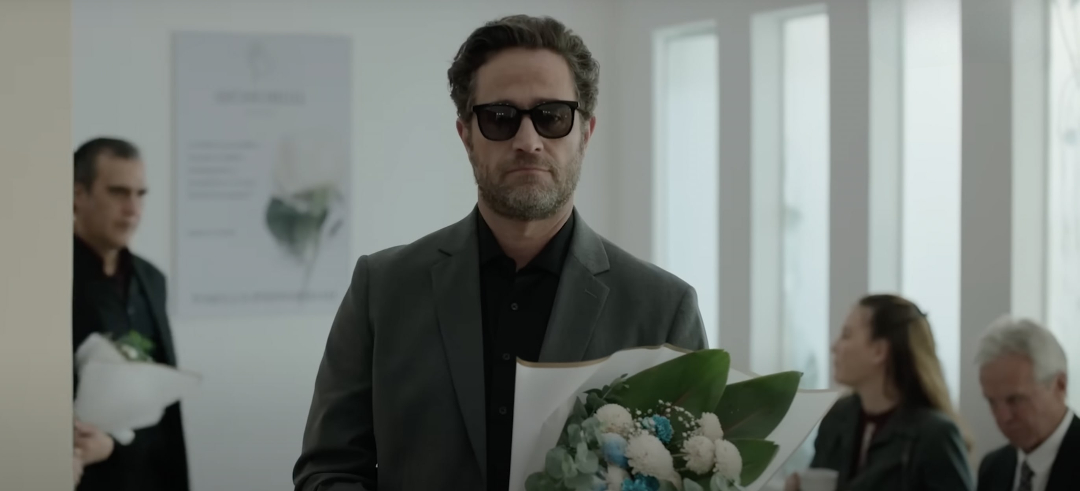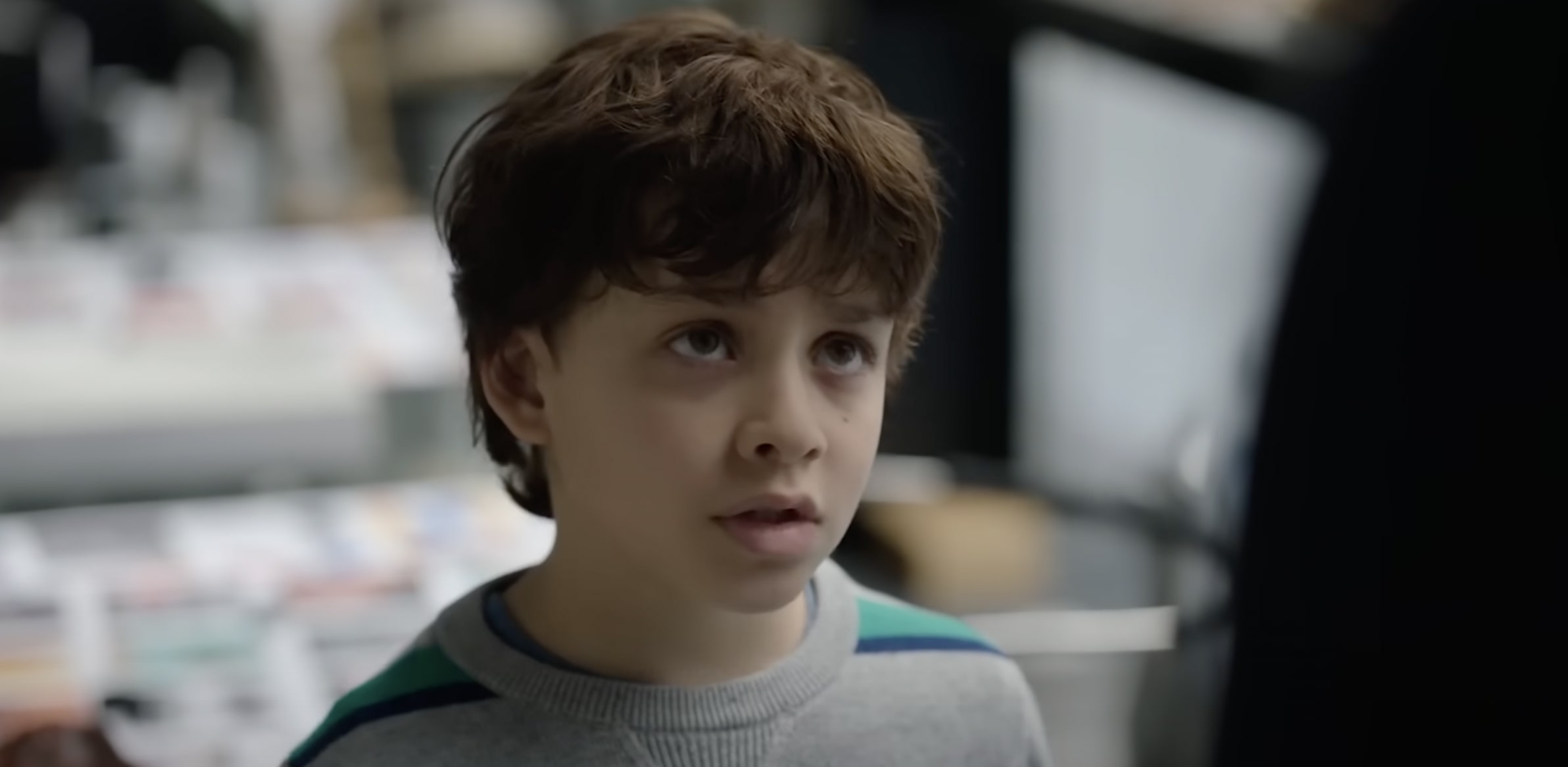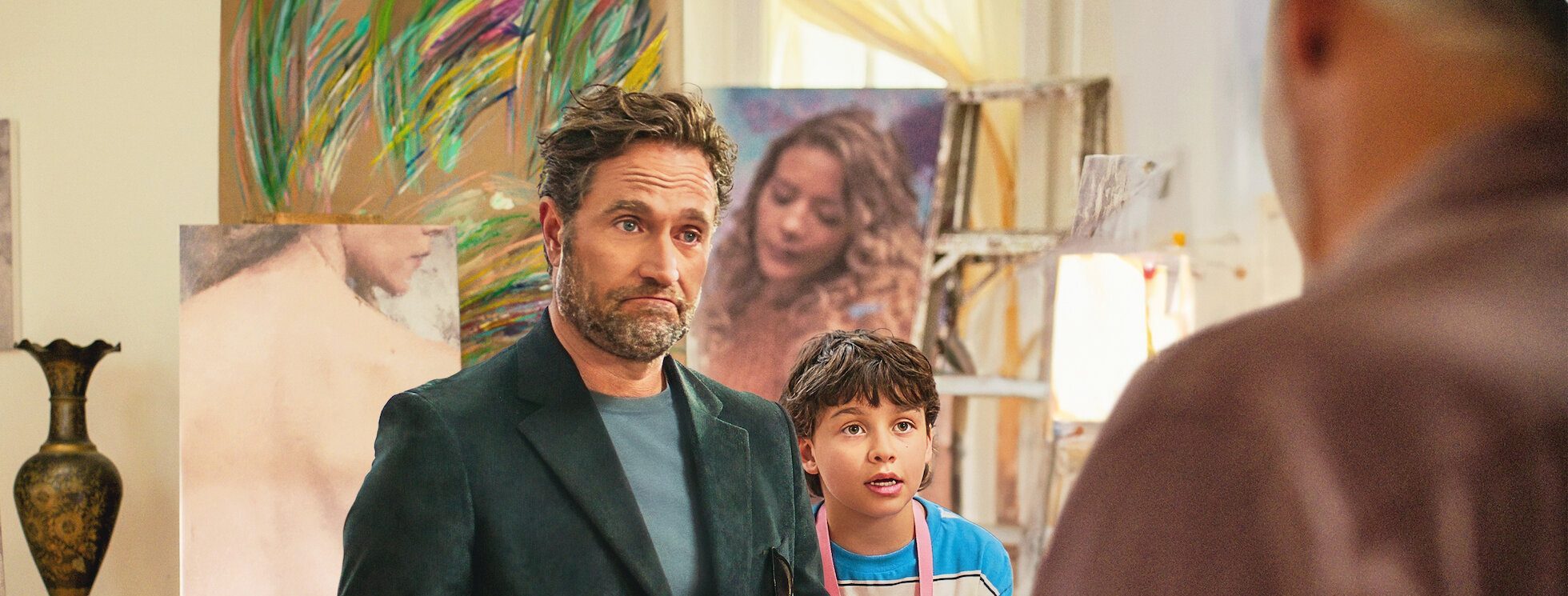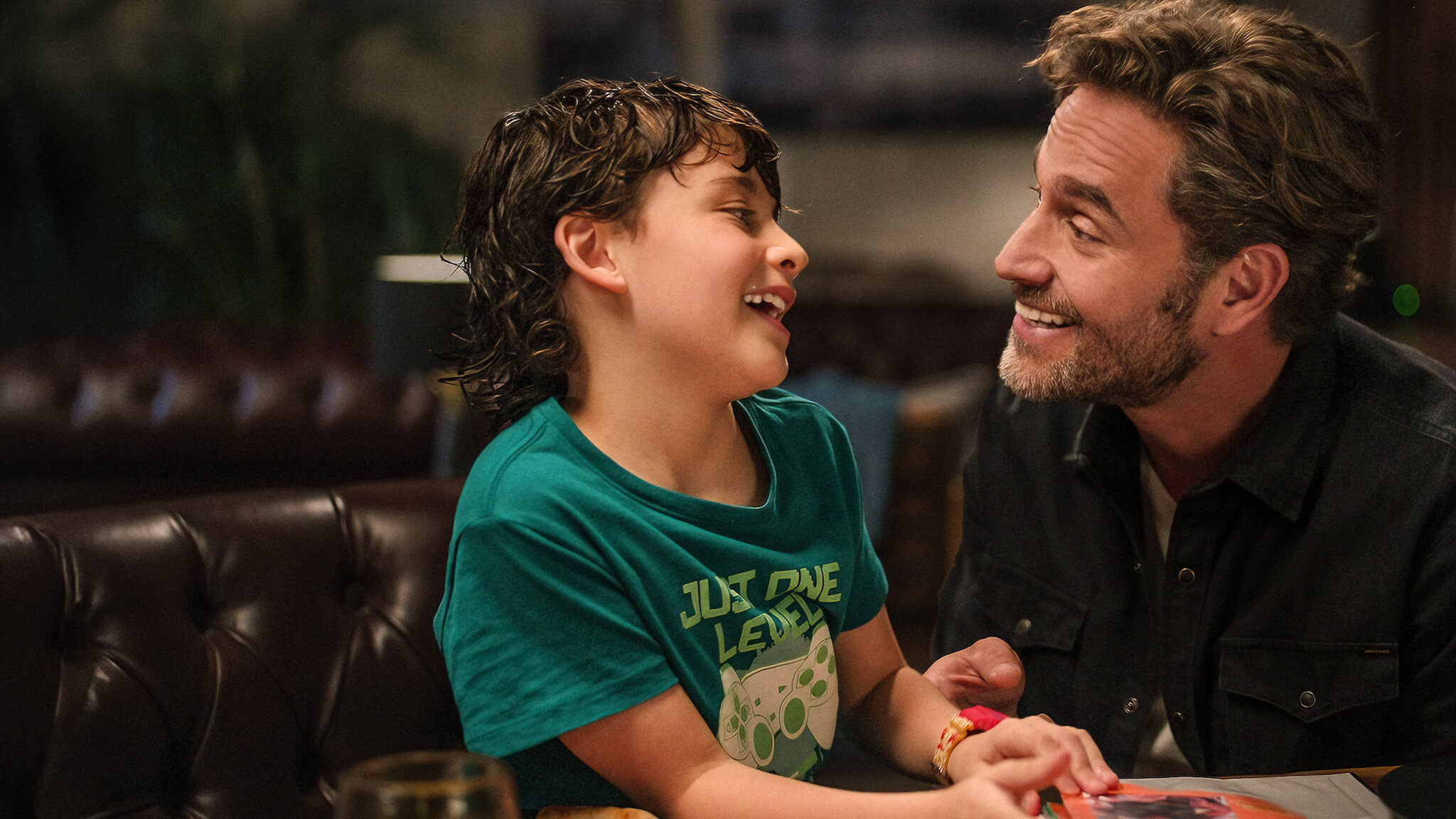Directed by Salvador Espinosa, Netflix’s Mexican road trip drama ‘The Dad Quest’ reaches a poignant yet deeply cathartic conclusion. While the film refrains from offering neatly wrapped resolutions for its central characters — Gabriell, a.k.a. Gallo and Benito — it delivers an emotionally fulfilling ending that resonates long after the credits roll. Their journey doesn’t resolve everything, but the bond they forge becomes the real destination. In true road-movie fashion, it’s not the answers that matter most, but the questions that linger — and ‘The Dad Quest’ leaves us with plenty to ponder. SPOILERS AHEAD.
The Dad Quest Plot Synopsis
‘The Dad Quest’ follows Gallo, a divorced TV producer who is emotionally distant and unprepared for the responsibilities of fatherhood. His strained relationship with his ex-wife Alicia and their son Benito becomes more complicated when Alicia informs him that she has accepted a consultancy job in Madrid and plans to take Benito with her. Gallo reacts with complete indifference, leaving Alicia shocked.

Soon after, Alicia dies in a road accident, and Gallo is suddenly thrust into the role of Benito’s sole guardian. Shortly after her death, Gallo discovers that Benito is not his biological son. He chooses to be honest with Benito, who, in response, expresses a desire to find his real father. Using contacts and clues from Alicia’s phone, Gallo and Benito embark on a journey across Mexico to track down possible candidates from Alicia’s past.
Along the way, they meet several men — including a painter, a fitness trainer, and a psychologist — but none turn out to be Benito’s biological father. They are eventually joined by Diana, Benito’s learning psychologist, who helps guide them through the emotional and logistical challenges of the search. Despite their efforts, the search yields no definitive answers. The journey ends without resolution, but the experience forces Gallo and Benito to confront difficult truths and redefine their understanding of family.
The Dad Quest Ending: Who is Benito’s Biological Father?
The final stretch of ‘The Dad Quest’ begins when Diana, Benito’s learning psychologist, tells Gallo that Alicia once confided in her own psychologist about Benito’s paternity. Diana believes this man either is the biological father or knows who it is. Gallo and Benito agree to track him down, and the trio travels to Tepoztlán. However, things take a chaotic turn when Diana unexpectedly assaults the man. She storms out moments later, shaken and angry, but now with a new name: Enrique Vega — the owner of an agency called Happiness.

Following this lead, the trio of Gallo, Benito, and Diana sneak into a party hosted by the Happiness agency. They approach a man and ask for Enrique Vega. An older man comes out — neatly dressed, calm, accompanied by his wife and infant child. When Benito asks him if he knew Alicia Ugalde, Enrique expresses regret over missing her funeral and says everyone at the agency was saddened by her death. His tone is warm but distant, like a former colleague paying basic respects. There’s no surprise at hearing her name, no flicker of recognition about Benito, and no personal reaction that would suggest he once fathered a child with her.
Despite this, Benito quickly turns to Gallo and says that Enrique isn’t his dad — puzzling, given that he received no such confirmation from Enrique himself. They don’t have a private conversation, and Enrique certainly doesn’t deny being the father. The conclusion seems to come entirely from Benito — based on little more than a brief, surface-level interaction. This brings us to the heart of the matter: Enrique may very well be Benito’s biological father, but the film refuses to confirm or deny it. What’s clear is that Benito chooses not to see him as his father. Whether that choice stems from intuition, disappointment, or emotional exhaustion, we don’t know. But the fact that Benito lies — or at least jumps to a conclusion without facts — feels intentional. It’s not a deception out of malice but a way to close the chapter on a search that no longer serves him.
Throughout the film, Gallo transforms from a self-absorbed, reluctant caretaker to someone who shows up for Benito in flawed but genuine ways. Their journey isn’t clean or easy, but it builds a real, if messy, relationship. So when Benito claims Enrique isn’t his dad, it isn’t about Enrique at all. It’s about Gallo. Benito recognizes that the man who’s been there for him — through grief, confusion, and dead ends — is the only father figure who matters now. So, is Enrique Benito’s biological father? Maybe. The film gives us enough breadcrumbs to suspect it but deliberately avoids a definitive answer. What it offers instead is emotional resolution. Benito’s choice to dismiss Enrique — true or not — is his way of cementing Gallo’s place in his life. It’s less about DNA and more about who stayed when it counted.
Why Does Gallo Not go to Miami?
Gallo’s decision not to go to Miami isn’t driven by any external resolution — there’s no miraculous career recovery, no promise of stability. Instead, it’s the culmination of a quiet, internal transformation that unfolds throughout ‘The Dad Quest.’ At first, Gallo is a man deeply rooted in avoidance. He distances himself from real responsibility — as a father, as a partner, and even as a professional. The road trip with Benito isn’t something he initiates with emotional investment; it’s something he goes along with reluctantly. But somewhere along the way, something shifts. He starts to care — not just about finding Benito’s biological father, but also about Benito himself.

Still, Gallo doesn’t fully grasp the depth of this change until he hits rock bottom. Losing his job, or rather, his show being canceled and facing potential legal consequences, is a wake-up call. He panics and instinctively reverts to the only version of security he knows — running away. In his mind, Miami represents a clean slate, a place to start over professionally, where he doesn’t have to deal with the mess he’s created in Mexico. So, he heads to the airport, prepared to escape.
But fate places Javo — an old friend and a familiar presence — at that exact crossroads. Their conversation is the tipping point. What Javo expresses, in essence, is the realization that we often chase new opportunities, thinking they’ll complete us, when in reality, what we truly need is already in front of us — if we just take a moment to see it. Gallo has been so focused on what he’s losing — his job, his reputation — that he hasn’t fully acknowledged what he’s been building: a fragile but real connection with Benito.
This moment of stillness at the airport allows Gallo to breathe. To reflect. He realizes that leaving now would be repeating the same mistakes — abandoning someone when things get hard. For perhaps the first time, he doesn’t want to be that man. He doesn’t want to leave Benito behind, especially not after all they’ve been through together. So, he turns back — not because the consequences of staying have disappeared, but because he finally chooses to face them.
When Gallo goes to Benito’s grandmother’s house and is told Benito doesn’t want to see him, he doesn’t react with anger or defensiveness. He respects it. But he still shows up — at school and later, with gestures like the walkie-talkie and party plans. It’s his way of saying, “I’m here, I’m staying, and I’m willing to do the work.” It’s no longer about searching for the ‘real’ father. For Gallo, it’s about being a father — the kind that sticks around, listens, and tries, even when it’s uncomfortable. So, why doesn’t Gallo go to Miami? Because for the first time in his life, he stops running. He realizes that what matters most isn’t a new opportunity somewhere far away — it’s the one he nearly missed right in front of him.
Who is Enrique? How is he Connected to Alicia?
In ‘The Dad Quest,’ Ricky — formally introduced as Enrique — emerges as one of the most enigmatic figures in the narrative, not because of his direct actions but because of what he might signify in Benito’s search for identity. The film carefully constructs an emotional puzzle around the question of Benito’s biological father, and Enrique’s appearance in the final stretch introduces both clarity and ambiguity in equal measure. The fact that Enrique’s name comes up only after a series of failed leads implies he holds particular significance. His presence embodies the larger emotional tone of the film: a persistent ambiguity around fatherhood, belonging, and the difference between biology and care.

When Gallo and Benito finally encounter Enrique at a high-profile event, he is presented as a man who has moved on with his life. The film hints that Enrique knew Alicia, as she was also affiliated with the Happiness Agency. However, it remains unclear whether they were ever in a relationship that led to Alicia’s pregnancy. Additionally, the psychologist’s decision to name Enrique as Benito’s biological father—when asked by Diana—adds further ambiguity. When the child directly asks Enrique if he knew his mother, Enrique’s reaction is notably neutral—neither surprised nor emotional—leaving the truth unresolved.
This absence of emotional intensity could suggest that Enrique is not the biological father. However, another plausible interpretation is that Enrique may suspect he could be but never had confirmation. Perhaps he and Alicia shared a brief, possibly complicated relationship during her time at the Happiness agency. If that were the case, Alicia may have chosen to raise Benito alone, deliberately keeping Enrique uninvolved.
This would be consistent with the film’s recurring portrayal of Alicia as a woman who made deliberate choices to protect her son’s emotional environment. What’s particularly telling is that Enrique never directly denies being the father, but neither does he make an effort to inquire about Benito. This ambiguity feels intentional. By presenting a man who might be the father but who plays no active role in the child’s life, the film reinforces its central message: that fatherhood is not determined by DNA but by presence, care, and emotional commitment.
Benito’s final statement — “It wasn’t him” — marks the emotional resolution of this arc. It is not merely an identification of Enrique’s biological status but a recognition that what he was seeking was not a name or a bloodline but someone who chooses to stay. Gallo, despite his flaws and early detachment, proves himself to be that person. In the end, the question of whether Enrique is the biological father becomes irrelevant. He may be, or he may not — but he is not the dad. That title belongs unequivocally to Gallo.
Will Benito Stay With Gallo?
By the end of ‘The Dad Quest,’ the emotional and narrative trajectory strongly suggests that Benito will stay with Gallo. While the story begins with emotional distance and a fractured dynamic between father and son, it gradually charts a course toward reconciliation, mutual understanding, and emotional bonding. The question of whether Benito will remain with Gallo is less a matter of legal custody and more a resolution of emotional alignment — and the film carefully ensures that the answer is a resounding yes.

From the outset, Gallo is portrayed as an absent and somewhat self-absorbed father, unsure of how to handle his responsibilities after Alicia’s death. He forgets to pick up Benito, shows little initial interest in the child’s emotional world, and is seemingly more concerned with work than with parenting. However, as the film progresses, Gallo embarks on a journey — both literal and emotional — to help Benito find his biological father. In doing so, he inadvertently learns how to be a father.
The turning point comes not from a DNA test or the discovery of a biological connection but from the gradual, growing bond between Gallo and Benito. Their interactions — from talking on toy walkie-talkies to eating pizza together, from flipping through childhood albums to weathering the emotional fallout of Alicia’s absence — reshape Gallo’s role from an accidental caretaker to a committed father figure. Benito, too, begins to see Gallo less as an unreliable adult and more as someone capable of genuine care.
There is also narrative closure to consider. Benito initiates the journey to find his “real” dad, but by the end, he chooses to return not to his grandmother, who represents safety and tradition, but to Gallo, who has changed and grown. This act of choosing — Benito running into Gallo’s arms — affirms their mutual commitment. It suggests that Benito has made an emotional decision to stay, and Gallo is finally ready to live up to that responsibility. Thematically, ‘The Dad Quest’ closes not with a legal resolution but an emotional one. The biological question is rendered moot; what matters is the transformation Gallo undergoes and the bond he earns. In that sense, Benito staying with Gallo is not just likely — it is the natural, inevitable conclusion to a story about imperfect love, redemption, and found family.
Read More: The Assessment Ending Explained


